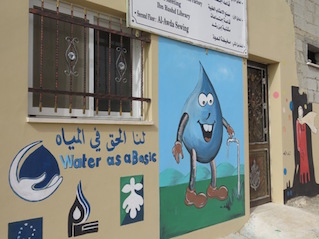 Women's committee building and kindergarten in Al-Aqabah. Photo: Yaron Kelner
Women's committee building and kindergarten in Al-Aqabah. Photo: Yaron Kelner
Dear friends,
I get up, wash my face, brush my teeth, flush the toilet, make a cup of coffee, jump into the shower. I wake my children, and if I have time I put on the washing machine and wash the dishes from yesterday. Many of us have this morning routine. Now think about doing all of this with little water – imagine what it would be like if the community you live in is not connected to infrastructure; if water was brought from far away and was worth its weight in gold.
When a fifth of your family income goes towards paying for water, you learn to save – even at the expense of your health, livelihood and dignity. Two weeks ago I visited with our staff the village of Al-Aqabah, in the northern Jordan valley and met some of the village residents. “In the winter I bath the children only twice a week. I take an empty 20-litre paint bucket, fill it with hot water and shower my three children with their help.“ “I wash the floor with the water that I used to wash our clothes. I wash the dishes in a large bowl, and then take the water from the bowl and water the trees in the yard.” “I always think twice about whether to shower or not, because I’m afraid there won’t be enough water for my daughters. My daughters don’t shower every day either. I always prefer that the goat will have water to drink than to wash my hands.” This is what the village residents told us.
The village of Al-Aqabah is caught in a trap. Residents of the village, which was established during the Ottoman period and is located in area C, earn their livelihood through agriculture and farming sheep on the land that they own. The Israeli authorities refuse to connect the village to the water supply network, claiming there are no master plans or plans on the horizon. However, at the same time they refuse again and again to respond to the residents’ attempts to regulate the planning and construction in their village and refuse to approve the plan they submitted.
Israel’s water policy in the West Bank has severely affected the ability of villagers to derive natural sources of water in the valley. They are forced to buy and transport water from neighboring villages, which costs three times more than what people pay if they are connected to the water supply. They save the water they have and their water consumption is significantly lower than the minimum amount recommended by the World Health Organization, to the extent that it is a health hazard. To make things worse, laboratory tests revealed that the water in the village, which is transported in tanks and transferred to wells, is not safe for drinking. Many children suffer from diarrhoea and vomiting due to the contaminated water.
The shortage of water is not the only difficulty that the village faces. However the determined and united residents of Al-Aqabah refuse to live in squalor, and have managed to resourcefully and creatively maintain a normal life and meet their basic needs. The village is tidy, and murals adorn the walls of public buildings. Residents have built a school, a mosque, a clinic and a kindergarten.
The local women’s committee has been working to promote the rights of women through economic empowerment and employment solutions (the village has a factory for herbal tea and a dairy that produces cheese), political and social participation and prevention of violence.
But in spite of all these efforts, the right to water remains an ancient issue that is frozen in time and has become a reality of life.
ACRI’s Attorney Sharona Eliahu-Chai filed a petition this week on behalf of the residents, demanding that the village be connected to the water supply and to stop the severe harm to the residents’ rights to health, livelihood and dignity.
Yours,
Sharon
Sharon Abraham-Weiss
Executive Director
Association for Civil Rights in Israel








